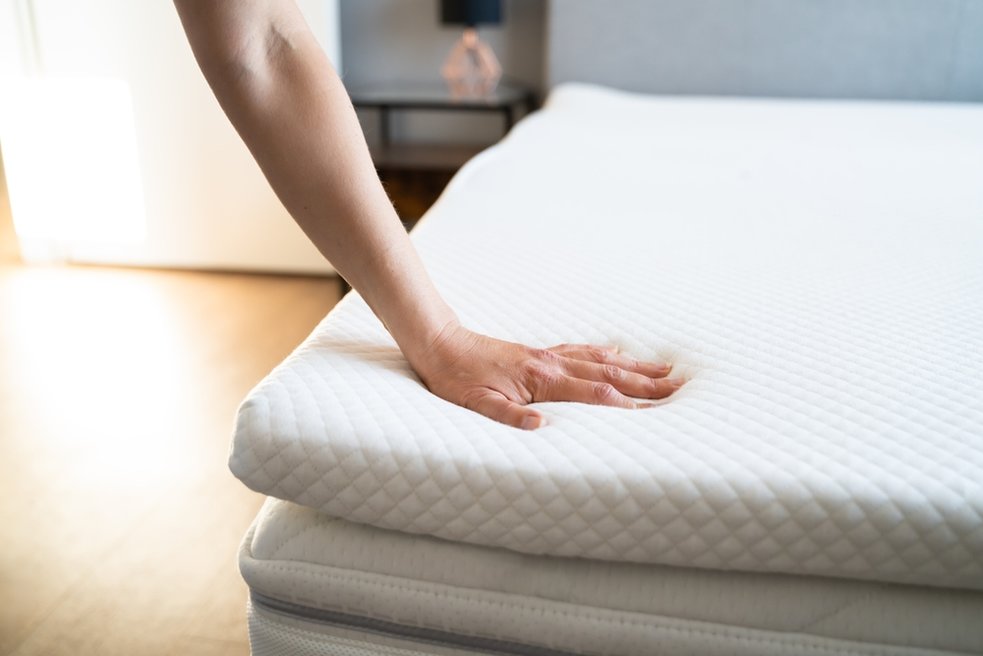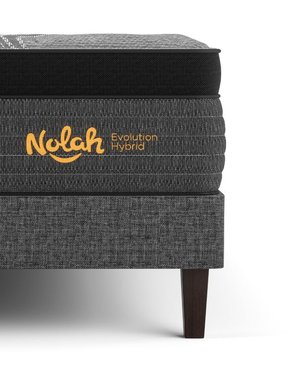Mattress Pad vs. Mattress Topper
Want to improve your bed without buying a whole new mattress? A mattress pad or mattress topper can go a long way to making your sleep setup more comfortable. Plus, these products help defend your bed from wear and tear, protecting your investment.
This guide will walk you through the similarities and differences between these two accessories and help you determine which is best for your sleep situation.
Mattress Pads vs. Mattress Toppers: Comparison Chart
Quality
Pads
Toppers
Protects Your Mattress
Yes
Yes
Adds Cushioning and Comfort
Yes
Yes
Adds Support
No
Yes
Price (Queen)
Quality options start around $200
Quality options start around $350
Mattress Pads
What Is a Mattress Pad?
A mattress pad is a cushioning layer you can add to any bed. They consist of an outer fabric shell and infill that provides the pad's plushness and volume. Mattress pads are much thinner than mattress toppers, closer in structure to a comforter that goes under your bedding.
While adding luxury, mattress pads also protect your mattress. They essentially act as a mattress protector, but with added padding. If you have a mattress pad, you do not need to use a mattress protector underneath.
Depending on the type of mattress pad you purchase, it may be waterproof, moisture-wicking, antibacterial, hypoallergenic, machine-washable, or a combination of these qualities. A mattress pad will help protect your mattress from regular wear and tear, extending its lifespan.
Like fitted sheets, mattress pads typically attach to your mattress with elastic-lined pockets in each corner. They fit snugly against your bed, and your fitted sheet and other bedding go on top.
Who Should Buy a Mattress Pad?
Mattress pads are great for sleepers who are happy with their mattress and want to protect it while adding a touch of padding. You'll notice the difference in the cushioning of your bed, but it won't completely transform its feel. A mattress pad won't save the day if your mattress lacks support or pressure relief or is way too soft or firm for your liking. However, it will keep your mattress safe and clean.
Mattress pads are great for sleepers who are happy with their mattress and want to protect it while adding a touch of padding.
What to Look for in a Mattress Pad
Fabric
We recommend a mattress pad with a soft, smooth, breathable, and highly durable fabric shell. Extra points for moisture-wicking and temperature-regulating fabrics that help keep your bed cool. If you tend to sleep warm, avoid potentially heat-trapping synthetics like polyester and nylon.
Bamboo viscose and organic cotton are our favorite mattress pad fabrics. If you opt for a waterproof mattress pad, look for one with a thin backing. The last thing you want is to trap heat beneath the pad or add a crinkly layer to your bed that rustles every time you move.
Filling
The point of using a mattress pad rather than a standard mattress protector is to add softness and cushioning to your sleep surface. The pad's filler material will largely determine its feel; down, down-alternative, cotton, microfiber, polyester, bamboo viscose, and wool are the most common mattress pad fillings.
To avoid overheating, we also suggest staying away from microfiber and polyester. Plus, these synthetic materials aren't quite as comfortable or durable as their natural counterparts.
Mattress Toppers
What Is a Mattress Topper?
A mattress topper sits on top of your mattress, providing extra comfort and support. They're thicker and more structurally substantial than mattress pads—quality mattress toppers significantly affect the feel of your mattress. Mattress toppers can also add contouring, pressure relief, and cooling.
Like mattress pads, mattress toppers have protective benefits. They add another layer between you and your mattress, defending it from wear and tear. However, mattress toppers sit on top of your bed—they don't encase any part of the mattress. So, if you want to waterproof your mattress or protect it from critters, we recommend using a mattress protector along with your mattress pad.

Who Should Buy a Mattress Topper?
Mattress toppers are ideal for anyone who wants to alter or improve the feel of their bed. For example, if your current mattress is too firm for your needs, you can add a plush topper to soften the feel and add contouring. If your mattress is too soft and doesn't provide enough support, you can purchase a firmer mattress topper to keep your spine aligned.
Mattress toppers are ideal for anyone who wants to alter or improve the feel of their bed.
What to Look for in a Mattress Topper
Cover
Not all mattress toppers have covers, but we prefer those that do. A cover adds an extra layer of cushioning and protection, and covered mattress toppers are far more durable.
As with mattress pads, we recommend soft, durable, and cooling outer fabrics. Again, we think organic cotton and bamboo viscose work best. These breathable materials allow easy airflow and wick moisture, keeping the mattress topper cool. They're also exceptionally soft and comfortable.
Foam or Filling
On the inside, mattress toppers consist of a single foam sheet, or they're stuffed with a loose filling.
The first type tends to offer more structure and support. You'll most commonly see mattress toppers made with memory foam, another polyfoam, or latex foam. We suggest a breathable, durable, and pressure-relieving option, like the Nolah Mattress Topper made with Nolah AirFoam™.
When it comes to loose infill mattress toppers, down and down-alternative are the most common options. While soft and cushioning, stuffed mattress toppers don't offer as much support as the foam versions. They work great for sleepers who want to add plush comfort but not those who want to make their mattress feel firmer or who need to improve spinal alignment.
Thickness and Firmness Level
Your ideal mattress topper thickness and firmness level depend on what you hope to get from it. As previously mentioned, you can use a topper to make your bed softer and more contouring or firmer and more supportive. When deciding on a topper firmness level, think about it relative to your current mattress. Head over to our Mattress Firmness Guide to learn more.
Enhance Your Mattress with a Pad or Topper
Whether you choose a mattress pad or a mattress topper, the extra layer will add comfort and protection to your bed. Pads and toppers are worthwhile investments, as they lengthen the lifespan of your mattress and help you get the restorative rest you deserve.
Disclaimer: Nolah does not provide medical advice. All resources on the Nolah blog, including this article, are informational only and do not replace professional medical counsel. Talk to your doctor about any health, mental health, or sleep-related issues.
You May Also Like These Articles
Don't Sleep on Exclusive Offers
Sign up for our newsletter, and you'll be the first to know about discounts, deals, and what's new at Nolah.
Ready for Bed?
